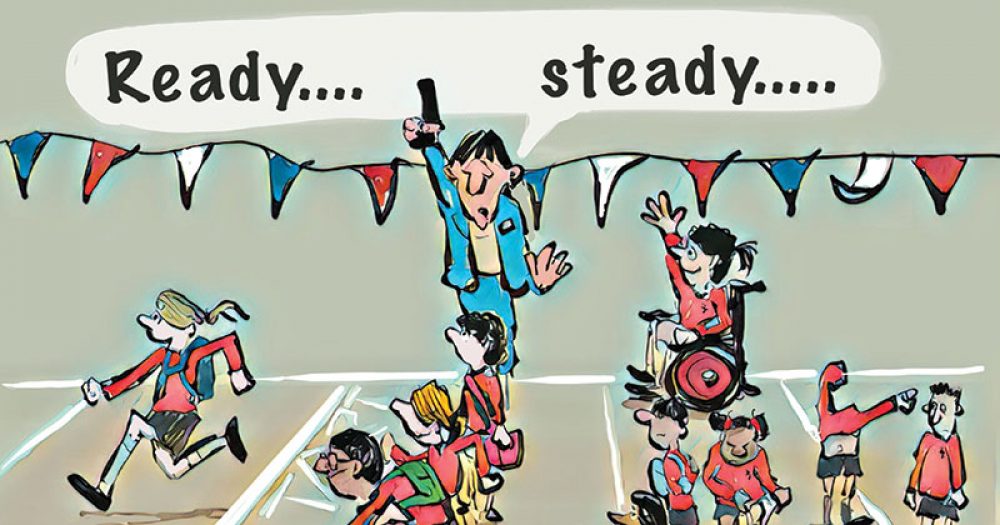Education has “not done anything” to improve social mobility and has made inequality worse, according to the education economist Stephen Machin.
Speaking at a debate held by the Sutton Trust on Wednesday in central London, Machin said education had been a “dequaliser” because it benefited rich pupils more.
“Education has not been the great leveller. It’s either done nothing for social mobility, or it has reinforced existing inequalities.”
Time at school strengthened the link between pupils and their family backgrounds, said Machin, a professor at the London School of Economics, meaning more rich pupils ended up in higher education.
He also cited the OECD’s finding in 2012 that in 20 developed countries, only young people in the UK and US had as poor literacy and numeracy skills as their parents’ generation.
There is a danger this aspect of education would get lost in our disappointment that it’s not a route for social mobility
There have been some “minor improvements” in school outcomes but “in terms of the bigger picture, these are not really that important”, he said.
Anna Vignoles, professor of education at the University of Cambridge, said the government would have to “disproportionately” invest in poor pupils’ education to help them to get high-status jobs and wages.
She suggested removing the subsidy for childcare for higher earners, directing the money instead towards poor children in early years.
Even then, she predicted that “you would see the middle and upper classes continue to outstrip any investment the state could make”.
It comes as a report by the Sutton Trust showed an increasing public pessimism about social mobility.
In 2008, 53 per cent of respondents said “people have equal opportunities to get ahead”. By 2017, just 40 per cent agreed that was true.
But 2,000 respondents to an Ipsos MORI survey have faith in the capacity of comprehensive schools to enable social mobility, with 47 per cent backing high-quality schools over other educational alternatives, such as lowering tuition fees, to help poor pupils.
However at a panel debate, Vignoles said poorer children were already left behind by primary school, and continued to “divide” according to family income throughout school until they got lower grades, on average, than their richer counterparts at A-level.
This meant that many of the “policy levers” used to help poorer pupils achieve would fail, as family background continued to dominate, she said.
However, while it was “also true” that poorer children earned a “high return” from investments they put in education, rich children on average benefited from education more.
But Vignoles said education enhanced “lives and skills” and should “not be given up on”.
“There is a danger this aspect of education would get lost in our disappointment that it’s not a route for social mobility.”
Schools must concentrate on teaching pupils skills for weathering a new technological era of jobs, she added.








What exactly is social mobility? earning more than parents? moving up the class ladder?
If the former, then this can’t be sustained for ever (if inflation is taken into account). And if the latter, doesn’t this tell us more about British (particularly English) attitude to class – the presumption that some classes are superior to others?
In any case, education’s role in social mobility, however defined, is limited. http://www.localschoolsnetwork.org.uk/2017/07/social-mobility-is-assumed-to-be-good-but-what-is-it-and-can-it-rise-forever
The OECD didn’t say young people in the UK had ‘as poor literacy and numeracy skills’ as their parents. First, the survey covered only England and Northern Ireland. Second, the OECD warned the results should be used with caution because of problems with sample size; these particularly affected England and NI. Third, the OECD didn’t say literacy and numeracy skills of young people’s parents were ‘poor’. It said there’d be no improvement between the literacy and numeracy skills of young people and adults aged 55-65. On the face of it that might appear shocking but the OECD pointed out:
‘The lack of “improvement” between younger and older adults was not “necessarily because performance has declined in England/Northern Ireland (UK) … but because it has risen so much faster in so many other countries across successive generations”’
And it’s risen ‘faster’ in many other countries because the older generation in these countries had literacy/numeracy skills far lower than their English/NI peers. Any improvement, therefore, would be calculated from a lower base.
You’d think statisticians would know this.
If you’re not already suffering a headache after reading this comment, there’s more detail here: http://www.localschoolsnetwork.org.uk/2013/10/important-messages-in-oecds-skills-report-are-ignored-in-desire-to-show-the-report-proves-goves-reforms-are-needed/%23sthash.ch9nrvss.dpuf#sthash.Isp2lNPK.dpuf
When the issue is discussed, it’s often assumed that disadvantage is imposed ‘top-down’, but the picture is more complex. Some disadvantaged communities have an aversion to education which leads to behaviour issues that hold children back. One researcher described them as ‘sabotaging their own futures’.
As a trainee teacher, I learned that the main determinant of educational success is ‘quality of discourse in the home’, and 5-year-old children of lower socioeconomic status score more than two years behind on standardised language development tests by the time they enter school. No wonder they feel alienated and helpless and assert themselves via the strategy of refusal.
This has been the subject of intensive research, but no-one has yet found a solution. Investing more in poor children’s education will only work if the families themselves can be persuaded to invest in their own learning, and there are many psychological and cultural barriers to doing this. It might be better to work on reducing poverty generally than on targeting education.
[…] Staufenberg, J. (2017, July 16). Education has ‘done nothing’ to improve social mobility. Retrieved from Learning and Skills Events Consultancy and Training: https://schoolsweek.co.uk/education-has-done-nothing-to-improve-social-mobility/ […]